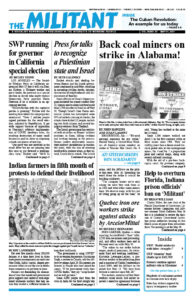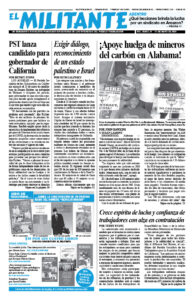June 3, 1996
Fidel Castro speaks on 35th anniversary of the victory of the Cuban revolutionary armed forces at the Bay of Pigs:
We know that the United States would not pardon us for making a revolution.
What kind of revolution was it? It was a revolution of justice in a country that was enslaved, exploited, humiliated, where there lived a valiant, heroic people who had struggled a long time so that their powerful neighbor would not take them over.
They were not going to allow our revolution to be an example for the peoples of Latin America living under similar conditions, and they believed, with disdain, that they could crush us. This was a different kind of revolution, this was a popular revolution of the people, by the people and for the people which defeated one of the best organized and trained armies in the hemisphere.
June 4, 1971
In the past weeks, several victories have been won in the struggle to eliminate all legal restrictions on the right to abortion.
The New York Supreme Court ruled unconstitutional an order to deny state payments for abortions requested by women who receive Medicaid assistance. A New York Supreme Court justice ruled unconstitutional an attempt to declare abortions done in doctors’ offices illegal. Another concession was the decision of the California Supreme Court that a pregnant minor does not need her parents’ consent to have a therapeutic abortion (“therapeutic” abortions are performed to preserve the physical or mental health of the woman).
These victories, although modest, show that the women’s movement can win gains through a struggle to mobilize masses of women and win public opinion for the repeal of antiabortion laws.
June 1, 1946
Climaxing his savage strikebreaking offensive against American labor, President Truman on May 25 called on a special joint session of Congress to enact the most repressive legislation against the labor movement ever advocated by a head of the U.S. government. The most drastic proposal was his request for Congress “immediately to authorize the President to draft into the armed forces” all workers “who are on strike against the government.”
This means that the President could break any strike by ordering a plant “seizure” and then driving the workers back to work under penalty of imprisonment for draft evasion or desertion.
Not only striking workers, but “officials of labor organizations representing the employees” can be “inducted into the Army … at such time, in such manner and on such terms as may be prescribed by the President.”

